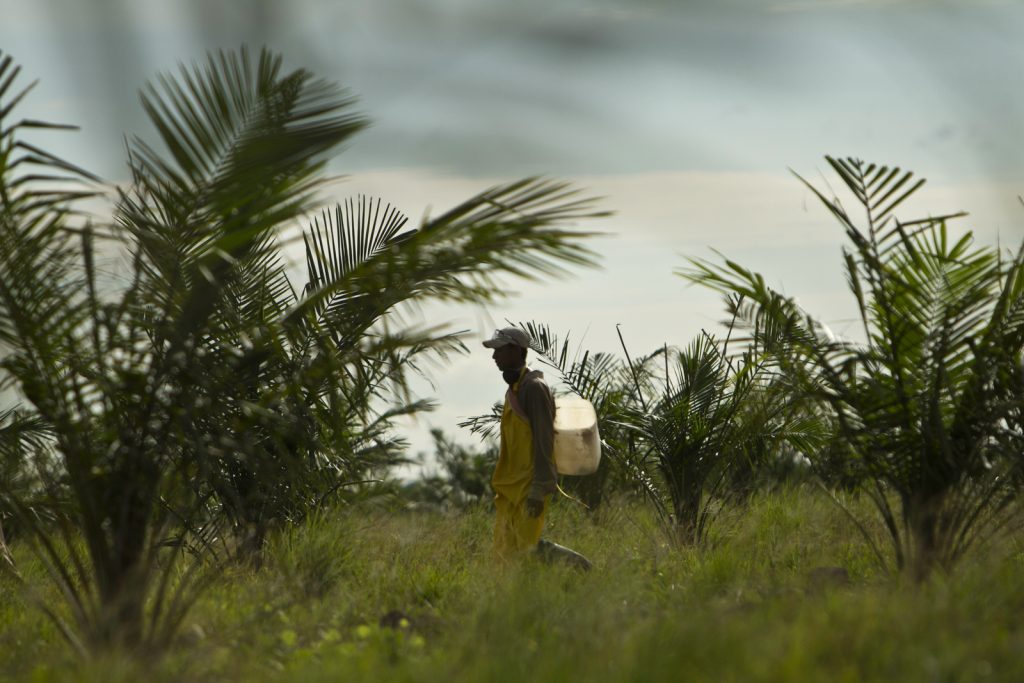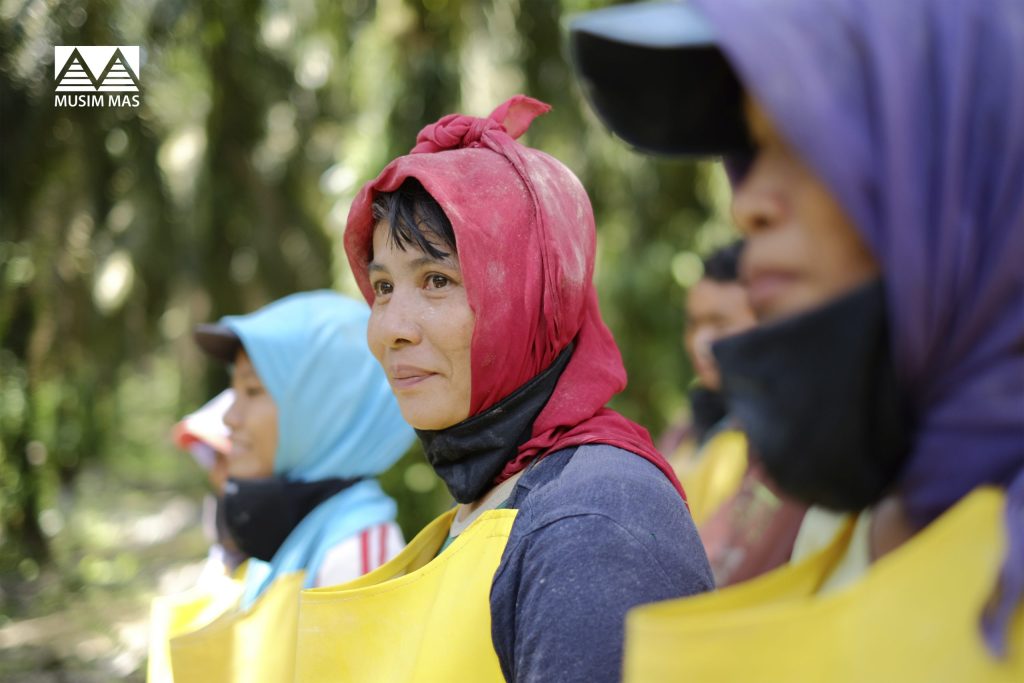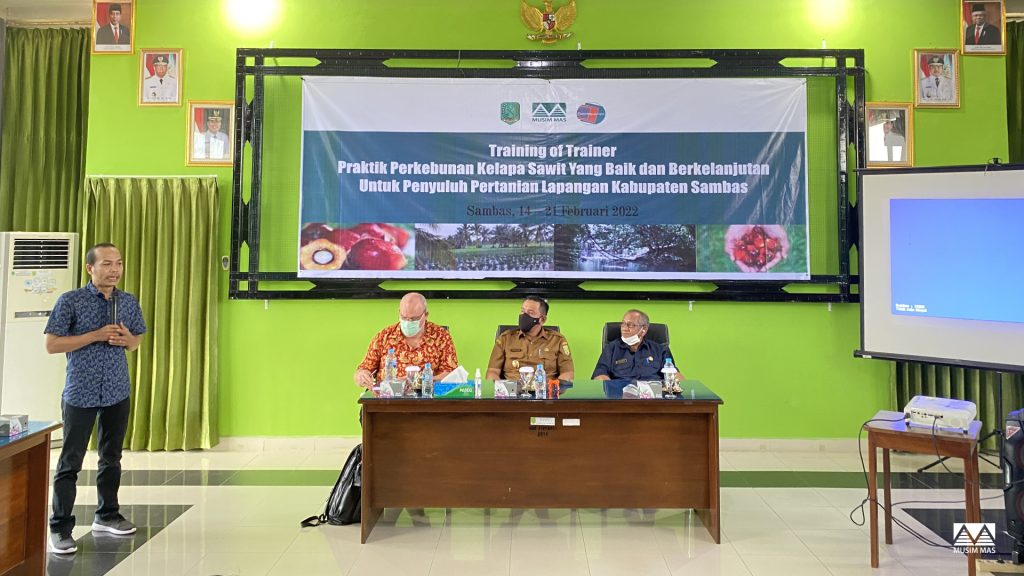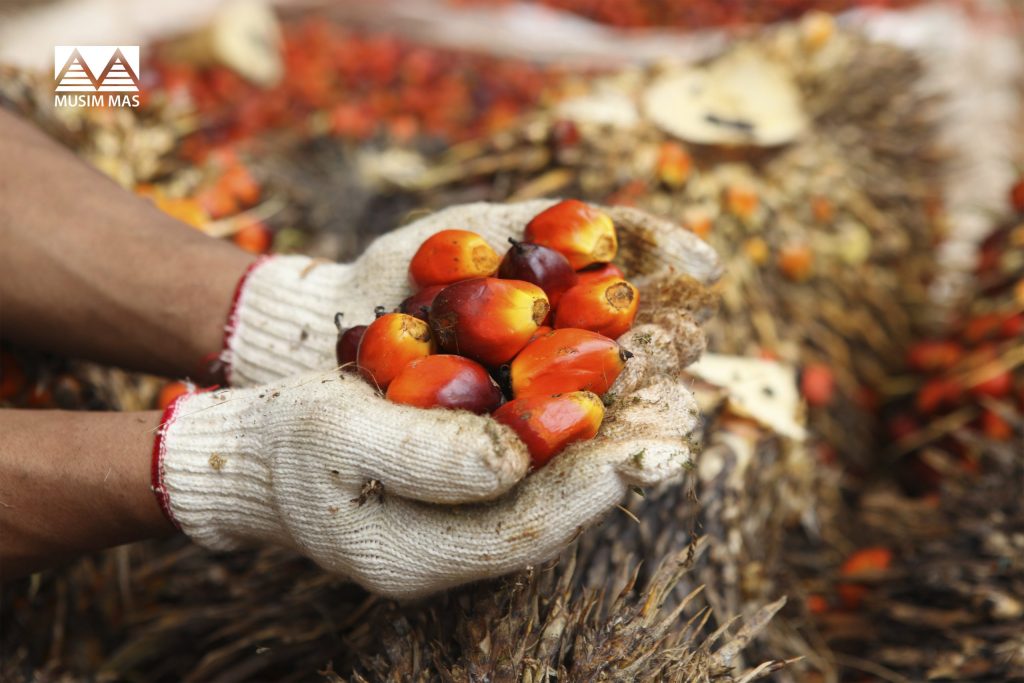Palm oil grower and processor Musim Mas has learnt a key success factor when supporting smallholders: the buy-in of local governments is vital and determines how far and how fast companies can reach independent palm oil farmers.
Lessons from a collaboration between Musim Mas and the International Finance Corporation (IFC) from 2015 to 2019[1] – Indonesia’s biggest smallholders programme, which engaged over 35,000 farmers[2] – form the basis of the company’s current initiative. Through Smallholders Hubs in six districts in Indonesia, Musim Mas and partners train extension service workers, who are funded by the government to teach farmers good agricultural practices, on sustainable palm oil.
Smallholders are an essential part of palm oil production in Indonesia, the world’s biggest producer with 59% of the global output.[3] Independent smallholders are estimated to manage 4.2 million hectares (ha) of Indonesia’s palm oil area,[4] or over 40% of the country’s total; each farmer is estimated to manage between 1.8 ha and 2.9 ha.[5] By 2030, they are expected to manage 60% of palm oil area in Indonesia.[6]

The Smallholders Hubs act as a conduit through which palm oil buyers can contribute to ensuring these small producers can supply sustainable palm oil to the global markets. Nestlé and AAK support the Smallholders Hub in Subulussalam district, while Musim Mas collaborates with Unilever and PepsiCo in Aceh Tamiang and with General Mills in Aceh Singkil – all in Aceh province in Indonesia. A hub was also established in Dayun village in Riau as part of the Siak Pelalawan Landscape Programme, which is supported by eight palm oil buyers and traders including Musim Mas.
“Musim Mas’ smallholder programme is holistic: it looks at gender and how smallholders can produce more from the land they have, it supports alternative livelihoods, and it helps farmers with market access while engaging with local representatives,” said Mégane Chesné, Global Sustainable Sourcing Leader, Landscapes and Palm Oil at Nestlé.
Opportunities for smallholder inclusion is the third most popular criterion for downstream and midstream companies when they select landscape and jurisdictional initiatives to invest in, according to company submissions to CDP in 2022.[7]
Read the 2023 report Sharing Responsibility and Success: Companies Collaborate to Support Palm Oil Landscapes to understand why and how 62 companies have taken landscape-scale action in palm oil production landscapes. The study is a collaboration between the Tropical Forest Alliance, Proforest and CDP.
The Business Case to Empower Extension Officers and Smallholders
Musim Mas has an ongoing commitment to implementing No Deforestation, No Peat, No Exploitation (NDPE) production across all third-party mills, which often buy fresh fruit bunches from independent smallholders. The company’s work with smallholders reflects how these producers represent both “the biggest risk to our NDPE Policy” and “the biggest opportunity for yield enhancement and not land expansion”.[8] The training provided by the Smallholders Hubs, the linchpin of the company’s sustainability strategy, inform farmers on NDPE practices and help them to improve the oil quality and extraction ratio and thereby their livelihoods.
“Obviously, it’s a business decision, but it’s also good socially,” said Rob Nicholls, General Manager of Programmes and Projects at Musim Mas. “If we want to move ahead, we have to make sure that we bring the surrounding communities with us.”
Each hub offers village extension officers one week of training in good agricultural practices in palm oil, with tuition comprising practical exercises and interactive classroom teaching. Crucially, Musim Mas then places two of its own staff in the location for two to five years – depending on the specific needs of each district – to support motivated officers as they put their new knowledge into practice.
To date, Musim Mas have trained 460 village extension officers and 6,273 farmers as part of the Smallholders Hubs programme. It is estimated that some smallholders can increase their yield between 25 and 30% over the course of two years, by putting into practice the practices they learn from the trained officers. Musim Mas aims to reach 10,000 independent smallholders through the Smallholder Hubs by the end of 2025.[9]
Musim Mas has also deliberately focused on including women in their programmes – another lesson from the collaboration with IFC – not only because they help in the plantations, but because they also have great influence on how farmers’ incomes are spent and have been found often to be better at keeping records. The programme hires female field assistants to ensure women feel comfortable in the discussions and includes modules they are interested in, for example, on growing vegetables in their gardens to ensure better nutrition for the families.[10]

Collaboration with Local Government: A Critical Factor
Musim Mas shifted its approach to focus on training extension service workers instead of training smallholders directly, as occurred in the joint IFC programme, to respond to one demand: scale.
There are an estimated 47,606 extension service officers in Indonesia,[11] comprising civil servants and part-time workers, tasked with supporting farmers in good agricultural practices across various commodities. Importantly, as they are based in villages, the workers know who the farmers are and the issues in the local communities.
Companies traditionally choose where to invest in sustainability efforts by assessing deforestation risk, but Musim Mas has learnt that the receptiveness of a local government is crucial, and that they must balance these two factors. “A lack of government support may mean a programme cannot go ahead,” said Nicholls. Collaboration with local governments is also key as smallholders generally trust district governments and extension officers more than companies, he added.
Musim Mas engages the local governments directly and through partners. In Aceh Singkil in Aceh province and Sambas in West Kalimantan, Musim Mas has enlisted NGO Earthqualizer to engage the district government, monitor deforestation, train in NDPE and support agroforestry and land legalization programmes for smallholders.

“When the Bupati [district head] saw that these activities could support the district’s economic development, he agreed to support them,” said Swisto Uwin, Smallholder Programme Manager at Earthqualizer, referring to the process in Aceh Singkil. Earthqualizer’s involvement in the agrarian reform task force in both districts helped engagement with the governments for the Smallholders Hubs.
In Aceh Tamiang, Musim Mas worked with the Center of Excellence for Sustainable Plantations (Pusat Unggulan Perkebunan Lestari), which was established as a multi-stakeholder platform in 2019 under a district head decree to coordinate activities to achieve sustainable agriculture across the district.[12]
Challenges, Replication and Expansion
Musim Mas says the Smallholders Hubs model can be easily replicated, particularly if it is promoted by the local government. “It’s just going back to extension services. It’s not difficult; there are no trade secrets. The foundation of it is very simple; it’s just a willingness to learn, to try and to discuss with other players,” said Nicholls.
One of the challenges in expanding this work is that some CSOs with the skill sets necessary to run parts of the programme may have reservations about working directly with companies. Collaboration with other producers also may create concerns about competitiveness. “You need a neutral party, like IDH, to coordinate the different stakeholders,” said Carolyn Lim, Group Corporate Communications Lead at Musim Mas, referring to the non-profit’s work in convening to develop shared goals in Aceh Tamiang.[13]
Musim Mas is also keen to find a way for independent smallholders to access loans to fund the cost of replanting – replacing old or low-yield trees with higher-yielding varieties. While the government offers grants to cover half of the replanting costs, smallholders still struggle to access credit to fund the remainder, while replanting is key to ensure that farmers use existing planted areas, instead of expanding into forests.
But banks are now more receptive to discussing the issue, thanks in part to increased interest from the national government in supporting smallholders, said Nicholls.
“What we really want to see is smallholders become independent and sustainable; and sustainable means not just environmentally, but economically,” he added. These important stakeholders are key to achieving sustainable land use at scale and smallholder engagement is a significant step in preserving Indonesia’s forests while expanding palm oil production.
References
[1] Musim Mas, n.d. Musim Mas–IFC Smallholders Program.
[2] Carolyn Lim, 2023. “3 things we have learnt to trust in our sustainability journey”.
[3] United States Department of Agriculture, 2023. “Palm oil explorer”.
[4] Chain Reaction Research, 2019. Future Smallholder Deforestation: Possible Palm Oil Risk.
[5] Faisal M. Mohd Noor, Anja Gassner, Anne Terheggen and Philip Dobie, 2017. Beyond Sustainability Criteria and Principles in Palm Oil Production: Addressing Consumer Concerns through Insetting. Ecology and Society 22(2).
[6] B. Saragih, 2017. Oil Palm Smallholders in Indonesia: Origin, Development Strategy and Contribution To The National Economy. Palm Oil Agribusiness Strategic Policy Institute.
[7] TFA (Tropical Forest Alliance), Proforest and CDP, 2023. Sharing Responsibility and Success: Companies Collaborate to Support Palm Oil Landscapes.
[8] Musim Mas, n.d. “Smallholders”.
[9] Musim Mas, n.d. Musim Mas–IFC Smallholders Program.
[10] Ibid.
[11] Alfreds Tuter, 2023. “Kementan sebut jumlah penyuluh pertanian masih timpang” [Ministry of Agriculture says there’s imbalance in the number of agricultural extension service workers]. RRI.
[12] TFA, 2021. Jurisdictional Approach to Sustainability: Lessons Learnt from Private Sector Action in Aceh Tamiang, Indonesia.
[13] Ibid.
